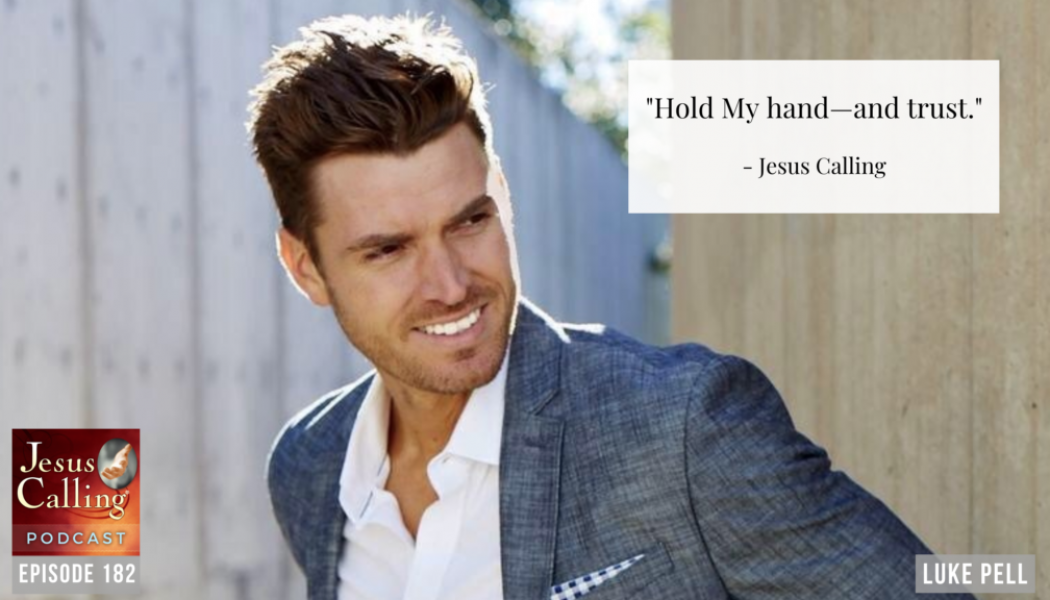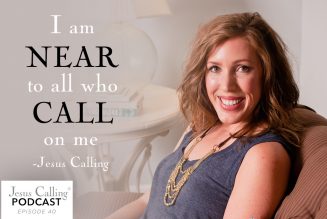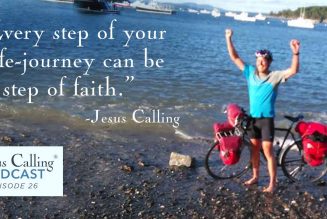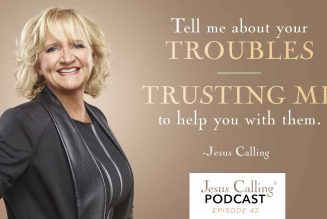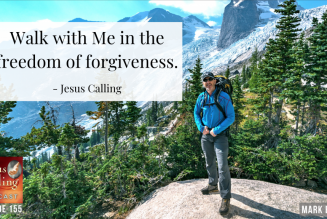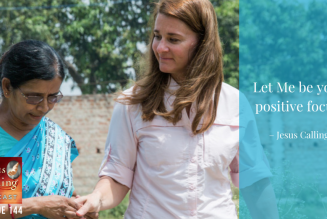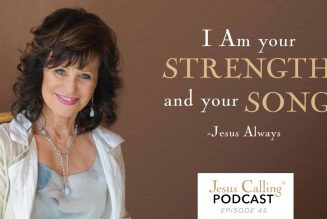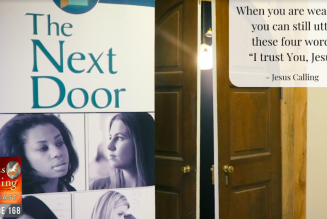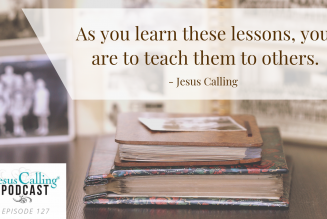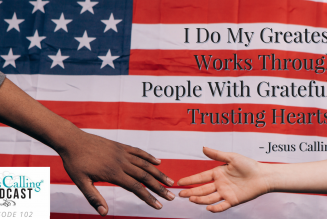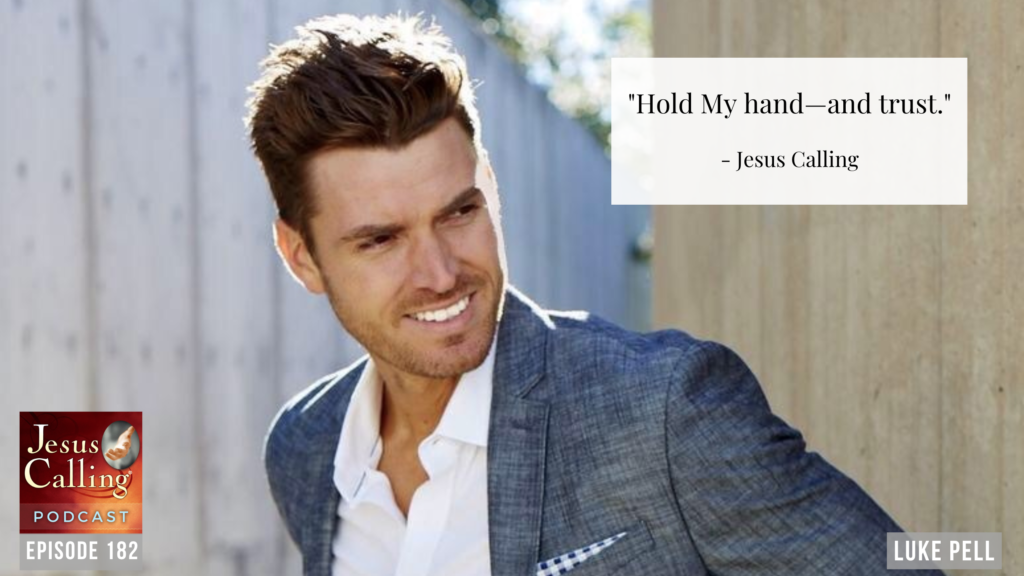
Luke Pell: My story, whatever that is now, whatever it will be in twenty years, for that to change lives, inspire people to overcome adversity, inspire people to know that they’re not alone, and inspire people to be patient and always look up and know that God has a plan and a purpose for their life—beyond what they feel in terms of vulnerability or anxiety or depression or not feeling sufficient for the expectations of other people around them, who’s looking at them or their audience. God’s love is sufficient and that’s all that they need.
His Hand Will Guide Us Through the Darkness: Luke Pell and Jack Deere – Episode #182
Narrator: Welcome to the Jesus Calling Podcast. This week’s episode features two men who have experienced pain and trauma in their lives, yet still profess that they could see the beauty of God’s hand as He led them through the darkness: TV reality show star Luke Pell and author and speaker Jack Deere.
As a contestant on ABC’s The Bachelorette reality show, Luke Pell found himself propelled into sudden fame and recognition. As he began to be watched by the world at large—often being publicly praised one day and harshly criticized the next—he found himself dealing with feelings of anxiousness and depression. Luke relied on the faith that had gotten him through a near-death experience following his service in the military to keep his heart focused on God during this time.
“What does faith mean to me?”
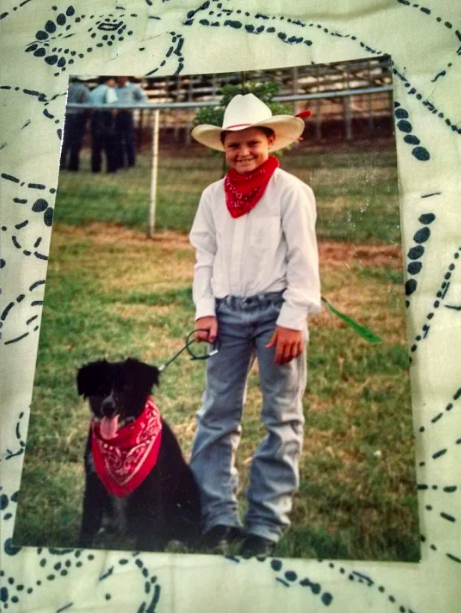
Luke: I grew up in a small town right outside of Austin, Texas, called Burnett, and my parents are retired and still there. We had a family cattle ranch that I grew up on , and I went to high school and played in the Friday Night Lights football timeframe, and my parents raised my sister and I in the church. It was a Baptist church that we went to when I was a child. I took piano lessons from the pastor of the church, I learned how to play the piano there. Music really started for me there, in that place.
It was a really solid foundation for me to start out on, to appreciate what it’s like to really grow up in a small town, a positive upbringing with great parents that are salt-of-the-earth people who knew the importance of faith and family and laid that foundation for us.
But as you become an adult, you have to figure out what your faith really means to you. Is it just what your parents taught you? Is it something that you were in a habit of doing? A place that you were in the habit of going to every Sunday as a kid growing up? Or is there a personal relationship? Is there more? Is there a purpose behind what your faith is and how you define that? As I went into my college years, I think that that’s really where I started figuring out what my personal journey was going to be.
“As you become an adult, you have to figure out what your faith really means to you.” – Luke Pell
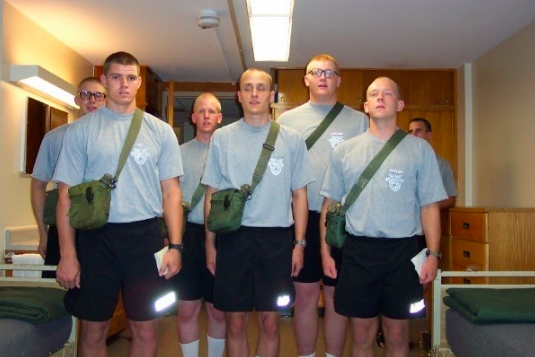
There were definitely some rollercoaster moments for me, a lot of ups and downs. I was in the military. I had a very clean break from my family life. When I was eighteen years old, I went to West Point on a football scholarship, and my family went with me on the first day to basic training and took me to New York. We said our goodbyes, and then I would only see my parents and the rest of my family once or twice a year after that while I was going to college at the military academy.
With that college experience, I was completely pulled out of that comfort zone that I had back down in Texas. I moved up to New York and fell into military culture and I had no clue what I was getting into. [It was] a very stringent academic load in an Ivy League academic situation. I had not really been prepared for that, I was just trying to make my way through and have success in life.
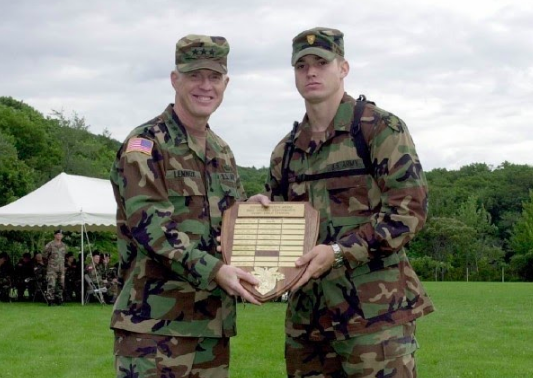
You begin to feel like you need to keep up appearances, and you begin to feel like you don’t want to be vulnerable, and you don’t want to show weakness, because that’s something that the military culture pulls in. You never want to show weakness on the outside. You always want to be very put together, very, very systematic about how you make decisions.
So those were the challenges emotionally, from a faith perspective that I started dealing with during those four years of my life. And that was just the beginning.
Finding a New Season in the Military
I graduated from West Point in 2007, and I went into my five-year commitment in the military as a U.S. Army officer. That was a new season, definitely, for me. That’s when my faith began to be challenged.
It was like, Hey, I’m more of a nine to five, go to class at officer training school, and then come home and have the rest of the weekend to do whatever you want. That’s when the temptations of partying and being a single, twenty-two-year-old guy became real. My faith was still there, but I wasn’t actively growing.
From a faith perspective, emotionally, and in any specific perspective in life, if you’re not growing and getting stronger and [going in] the direction of your goals, you’re going to be digressing in the wrong direction. You’re going to be sliding backward.
“If you’re not growing and getting stronger and [going in] the direction of your goals, you’re going to be digressing in the wrong direction.” – Luke Pell
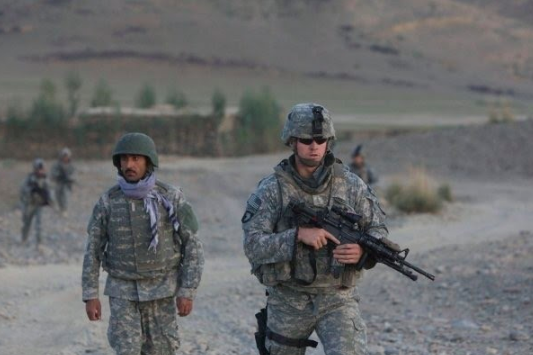
I think that started the season of really finding myself over the next three or four years, mixed with a lot of challenges in the military that were coming my way. One of those [challenges] was going to Afghanistan and learning to lead troops in combat at twenty-three years old, and the reality of, Maybe I’m going to face death when I show up in Afghanistan, or maybe I’m going to lose my legs. All these other fears start creeping in, and they’re of a different nature at that point. I was trying to be competitive, and to be a great leader in the military, and have success from a worldly perspective.
For me, that was starting to be more and more of a low point. I didn’t have a direction. I didn’t have a goal. I was just trying to bide my time while I was still in the military. You know? I was starting to wander a lot, back and forth from that path.
A Defining, Near-Death Experience
The military moved me to El Paso, Texas. It was my final duty station for the last two years I was in the military. I was frustrated about that, because I just felt like that happened to me. I was like, Well, I didn’t have a choice. Now I’m frustrated with being in the military because they’re moving me somewhere that I don’t want to be. This is not the life that I chose.
I was back to wanting to pull control of my own life, and [I wasn’t] giving it to God and saying, Look, whatever door opens and I’m supposed to walk through, I should be at peace with that, rather than [getting] angry. What did I do wrong? What could I have done differently to get where I wanted to be?
Luckily, I had a roommate that moved in with me out there, a really good friend now, a guy that I played football with named Ryan Branson. Ryan had just recently become a Christian maybe a year or two before that, so he was in a completely different spot in his faith walk. He was looking and digging and searching and always trying to grow in his faith because it was so new to him and me. I had gotten kind of stagnant, and I was angry and bitter and all these things.
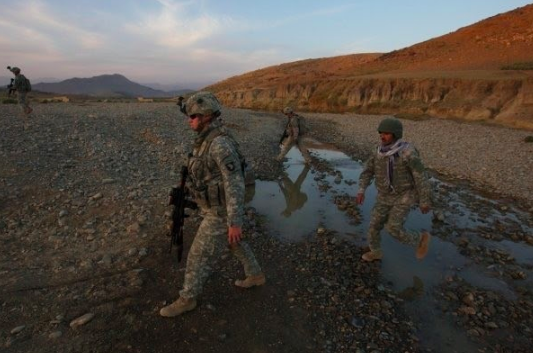
It was so refreshing to have Ryan come in. I think it was meant to be that way, that he would be my roommate, and that through the conversations that we started having, that his newfound faith would be the one that renewed mine and brought me back to a spot of being like, My purpose is not for me to have control. There’s so much more of a plan and a destiny out there than what I can come up with.
“One of the biggest victories in my faith was that I came back to a spot where I was completely surrendering my plans and my expectations back to God, and what purpose I was put on this earth for, instead of [wondering] what I could get out of this world and what people thought of me.” – Luke Pell
I was starting to make plans for getting out of the military, moving back to the civilian world, and getting a job there. And I had this rare infection, like one-in-a-million infection, that got into my heart. We didn’t know if it was from my wisdom teeth being taken out, or something like that. It was very rare, out of nowhere coincidence. I was twenty-six years old, and I went into heart failure and was admitted to the V.A. hospital in El Paso, Texas. It was to the point [that I was] in the ICU. My family flew in that night, all my extended family, friends.
My roommate was out of town at the time, and my ex-girlfriend at the time flew from Tennessee out there, because the consensus was that I was probably not going to make it. I was probably going to not make it through the night, I was going to pass away.
So I go from being healthy, being a former college football player that works out every day and felt like I was in top shape, to having a life-or-death situation that had nothing to do with combat that I had been through, that had nothing to do with anything expected or normal. It just completely blindsided me.
That was probably one of the most defining moments of my entire adulthood.
My faith just went to a completely different level at that point, because that I basically emotionally and mentally I had to accept like death. I had to accept dying at that time. I thought my faith was strong and then I wasn’t ready to die. I was desperately fighting it in my head.
All these people that come in, that love me—basically you’re just there, not knowing how the next day is going to go, if I’m going to make it, if I’m not going to make it. It was through that experience that I realized even more—I guess I’m hardheaded, I guess God kind of has to beat me over the forehead sometimes for it to make sense and really sink in with me. But that definitely did it. It is my purpose in this world, it’s completely His [purpose]. It’s up to what God has for me.

I can collect a bunch of money, I can collect a bunch of fame, I can collect a bunch of followers. All these things in this world I can knock off and I can shoot for all those worldly goals. But the day you die, none of that stuff matters, it doesn’t matter at all. Only one thing does matter: it’s the legacy that you left, the inspiration that you left in the world, the people that you inspired, your faith that you were able to show to the rest of the world around you, and the lives that you were able to change. That’s the only thing that you can leave here. That’s the only thing that matters if you die tonight.
“Only one thing does matter: it’s the legacy that you left, the inspiration that you left in the world, the people that you inspired, your faith that you were able to show to the rest of the world around you, and the lives that you were able to change.” – Luke Pell
Struggling with Anxiety and Depression
I continued to experience a lot of challenges after that, [which are] now helping me empathize, and helping me support people that have anxiety and depression.
Anxiety and depression—I was in the military, in a very alpha male society. I didn’t have much sympathy for somebody who had anxiety and depression. I felt like, Hey, there’s a lot going on in the world. You should have control of your stress. You should be mentally tough. Those were things that I had pulled from the military training.
[My] anxiety is basically PTSD. Not from a war, but PTSD from this traumatic experience of almost having a heart failure issue that didn’t recover. Anxiety and health anxiety became a real reality for me over the course of the next year or two, while I was healing and I went into physical therapy. I had to deal with what that real physical manifestation of anxiety was.
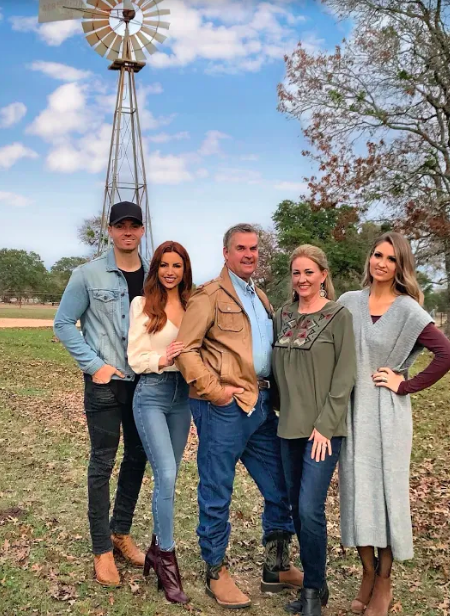
I was struggling with this emotionally and physically, something that I never saw coming, and something that I wished wasn’t a part of my life. But, you know, I finally am continuing to accept this as part of my purpose. [I’m] able to share that with other people, to share my vulnerabilities and the things that make me physically feel weak in this worldly body that I’m in. I think that there is something to be said for that, and there’s a reason for that, and I’m learning to embrace that now.
There is something to be said for what Jesus Calling does in the same way. If I’m sharing my vulnerabilities like anxiety, if I share that on social media, for instance, I’ll share a Jesus Calling passage on social media. I’ll share that I dealt with anxiety, or that that was an issue of mine on social media, and those are very internal battles that people sometimes are fighting. And I get more responses from people with those things than I do with anything else that I put out. Because that’s what matters. There’s people who are somewhere out in middle America that are struggling deeply with something that they’ve got nobody to talk to about. They don’t know where to turn, and they’re looking for inspiration. They’re looking for someone that they can relate to. Oh, wow. I’m not alone. Somebody else is dealing with this. They’re looking for faith to latch on to, to get them through to another day in their own life, in their own battle, that nobody else knows that they’re fighting.
I so much appreciate what Jesus Calling brings to the table and what it’s been for me as a daily devotional. I know a lot of people that I talk to [say] it can give you something that is very relatable to the problems that we’re facing today, what it is in the world that we live in now, and it completely defines the scripture that’s in there and how people can use that and apply that to their life. To have some roadmap for keeping your faith walk on track, that’s what Jesus Calling has meant to me. It’s been so cool to always have that, it’s been the one thing that I’ve always come back to when I’m looking for inspiration.
Reaching for Who God Says We Are

It’s been seven years since I dealt with that life-changing moment. In those seven years, I got out of the military. After I got out of the military, I almost gave up on being in Nashville. I felt like that was something that was put in me from a young age, being around music and the beauty of telling a story through a song and connecting with people through music. That was in me, and I wanted to be back here and do that. I felt like it was where I was supposed to be, so I finally was able to make that move back to Nashville.
His plan for my life is always in times when I am out of my comfort zone when I feel like things are completely going wrong. Back at West Point, [I was] thinking, I’m going to fail out my first semester, and then God shows up and comes alongside you through somebody that gives you inspiration, or however that message comes, “You’re gonna be okay. You’re gonna make it through.”
“Then God shows up and comes alongside you through somebody [who] gives you inspiration, or however that message comes, ‘You’re gonna be okay. You’re gonna make it through.’” – Luke Pell
Fast-forwarding through the military experience, the near-death experience with my heart condition, then moving to Nashville and feeling like, Wow, I don’t have a plan. I don’t have a real job. I’m kind of doing this entrepreneurial thing, and trying to rent some houses, and trying to put all these different things together. You feel very uncertain, and that’s when the search becomes God, what am I doing here? I feel alone out here. I feel like maybe this isn’t what I’m supposed to be doing.

And almost always, those moments are the ones that I know that He had a plan for me. That’s where that faith matters so much. It was the woman that touched Jesus’ cloak and the crowd, right? She had faith that if she just touched Him, that that’s what would change her, what would heal her. Faith becomes the focal point for what that defining moment is. I’ve really learned to appreciate those moments of uncertainty, when you’re feeling more alone and you’re feeling like you don’t know what tomorrow holds, you’re feeling like, Maybe I made the wrong decision, maybe I should change what I’m doing. Those are the times when I get the most direct purpose of God in my life.
“I’ve really learned to appreciate those moments of uncertainty, when you’re feeling more alone and you’re feeling like you don’t know what tomorrow holds. . . . Those are the times when I get the most direct purpose from God in my life.” – Luke Pell
I know that coming here four years ago, to do this full time, is the door that God did open for me. I was supposed to be there, and I think the most important part is it’s helped me unpack my story and what that is. It helped me learn how to tell my story and tell it in a way that is through music until, hopefully, [I can tell it] in a way that people can really connect with it and relate to it.
There’s more to come, and I continue to grow. I’m a work in progress, and I’ve learned through being on a dating reality TV show that the world is a very big judgemental, narcissistic place to be in, especially on the scale of being on a reality TV show that is all about the negative and the dramatic side of your private life.
I’ve been there and I’ve personally experienced that, the highs and the lows of being a reality TV personality. That was all praise, and people feel like you’re this character that can do no wrong, and they forget that you’re also a person, right? They really delve into your private life, and they realize that you’re just a human, just like everybody else, and you’re going to have shortcomings. You don’t know what the rest of the world is going to think about you. They may love you tomorrow. They may hate you to hate you the next day.
That’s been, I think, the biggest thing that I’ve been learning recently, through being exposed to a large audience in the world and being on reality TV and being in the entertainment business in and of itself.
“We have to really stay true to ourselves and true to our faith, and keep that faith walk intact, regardless of what the rest of the world is throwing at you every day. The more we’re thinking about the rest of the world and what they’re thinking about us, the less we’re thinking about what God has for us and where our faith walk should be.” – Luke Pell
I’ve seen that challenge firsthand. That’s something that I continue to work on and continue to look for answers in how to deal with that day today.
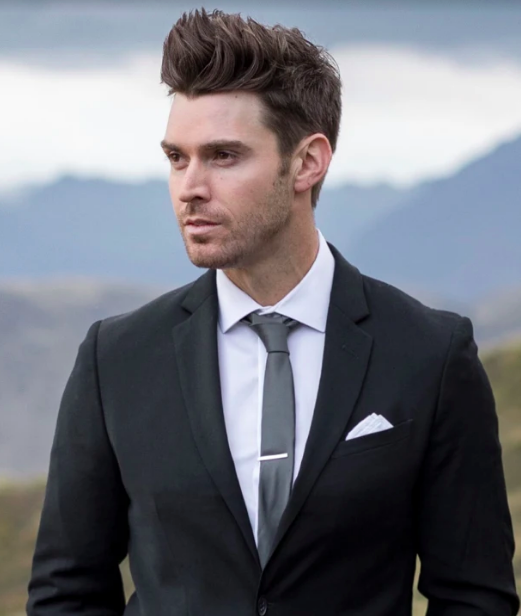
It’s sad that it took a near-death experience, but that will be the most defining moment—I’ll probably never have another moment more defining than that in my life, because it changed the trajectory of where I was headed, and it showed me God saying, “Hey.” Jeremiah 29:11 is one of my favorite verses: “Know the plans I have for you, says the Lord, plans for a hope and a future. Plans to prosper.” Right? That verse was defining for me, to realize that, He has a plan and His plan is the only one that matters.
Narrator: You can catch up with what Luke Pell is doing these days and hear his music by visiting LukePell.com.
Don’t miss the second half of our program with writer and speaker Jack Deere, after this brief message about a free offer from Jesus Calling.
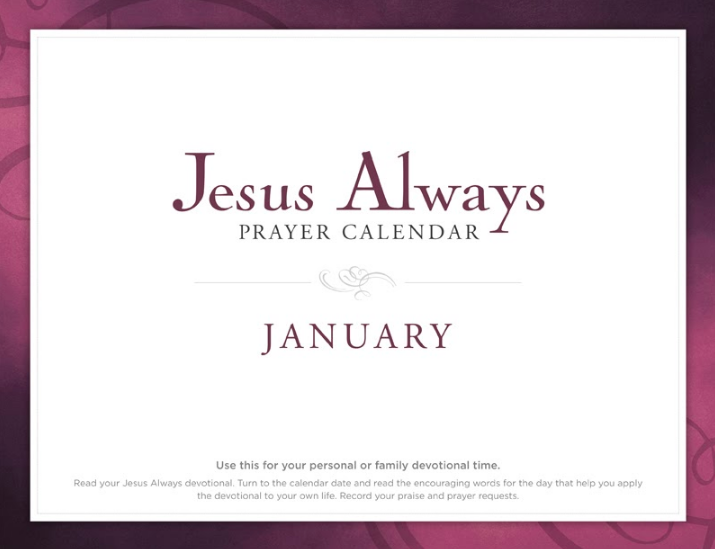 Are you looking for a way to keep track of your daily prayers along with Jesus Calling? The Jesus Always Family Prayer Calendar goes right along with your daily readings from Jesus Always. Each day begins with a guided reflection, followed by a space for you to fill in your prayers of thanksgiving and special requests. You can get your free Jesus Always Family Prayer Calendar by visiting JesusCalling.com/offers.
Are you looking for a way to keep track of your daily prayers along with Jesus Calling? The Jesus Always Family Prayer Calendar goes right along with your daily readings from Jesus Always. Each day begins with a guided reflection, followed by a space for you to fill in your prayers of thanksgiving and special requests. You can get your free Jesus Always Family Prayer Calendar by visiting JesusCalling.com/offers.
Narrator: Jack Deere, formerly an associate professor of Old Testament at Dallas Theological Seminary, is a writer and lecturer who speaks about the joys of establishing a friendship with God—a truth that was learned over years of time grappling with difficult events in his personal life. Jack opens up about his early family life the tragedies that happened to him as a boy, which he shares for the first time in his book Even in Our Darkness. Though he emerged from his abusive childhood and went on to be a seminary professor, pastor, and best-selling writer, tragedy would present itself again and would cause him to question everything he ever believed, and leave him wondering how he could ever trust in God again.
Facing Tragedy Early in Life
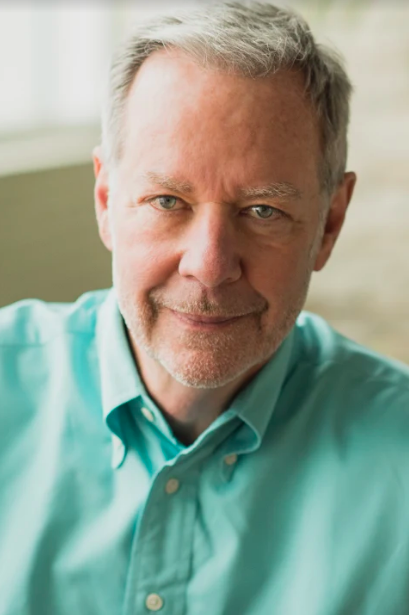
Jack: My name is Jack Deere, and I’m a writer. I’ve been a church planter, a seminary professor, and right now, I live in St. Louis, and I write and help out in the ministry of the church called Grace.
I grew up in Fort Worth, Texas, and we were a lower middle-class family. My dad worked for General Motors, he was a maintenance supervisor. And every day, he left for work, he kissed Mom, and when he came home, he kissed her again. My dad is my hero. He was the smartest guy in the world. He knew the answer to every question I asked him. I just idolized him.
Mom dropped out of high school in the eleventh grade to marry dad. She was sixteen, he was twenty-one. I never saw mom read a book. In the place of knowledge, she gave me tenderness. It looked like I was going to have the ideal family. Then, my two younger brothers joined us, Gary and Tommy.
And by the time I was six, I became aware of a war that was going on between Dad and Mom.
[Dad] got a promotion at General Motors, which put him on a night shift, so we didn’t see that much of him anymore. On the weekends, he would take air conditioning and plumbing jobs. My dad could fix anything.
To summarize it, he became an absentee husband and father, and she became an enraged, unloved woman. His absence fueled mom’s rage, so she started taking it out on us with beatings. Some of those beatings were really severe, screaming and raging. She was not a bad woman. I mean, she was not a sadist. She was an unloved woman. She tried to be good, but she could not get over the struggle with my father.
The thing that sort of shaped, or climaxed, the childhood for me was when I was twelve years old, with two younger brothers and a baby sister, my dad committed suicide in our home with a rifle, his childhood rifle. He left a thirty-four-year-old woman with a tenth-grade education to care for four kids.
We all just went wild. Mom went wild. I mean, there was a parade of men in our house. They all had one thing in common: they didn’t stay. So that was my childhood.
As I grew up and became an adult, if you’d asked me about my childhood, I would just say it was boring. All that trauma, I put behind me. In fact, I blocked out a lot of it and started remembering things when I started writing this memoir.
“[My] childhood produced this desire to keep really tight control in my life. I blocked out some of the stuff and thought, Feelings are bad. Stay in your mind. Don’t go to your feelings. That was the hardening effect that my childhood had on me.” – Jack Deere
“To Hear That God Won’t Leave You Is Too Good to Be True.”
I stole all my clothes because there was no money for clothes. I wanted to wear nice clothes. We were vandals, and we carried guns in our car. My younger brother Gary, the middle brother, became a drug dealer. I didn’t distinguish myself academically in high school, so I tried to distinguish myself by being the wildest kid in the group.
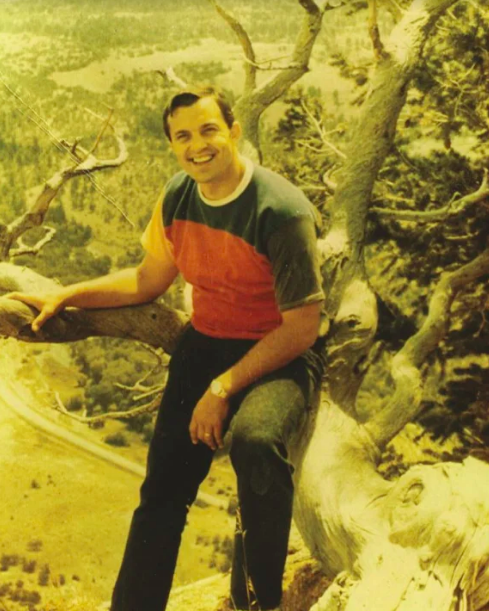
The turning point for me was that I was in a group of eight athletes. I was never a very good athlete. We all hung out together. All of our parents were either divorced or getting divorced, alcoholic or becoming alcoholics. We were eight kids, basically out of control. My best friend in that group became a Christian, and we exiled him from the group. This was the beginning of our sophomore year in high school. We kicked him totally out of the group.
He prayed for me for eighteen months, even though he didn’t see me very much. He prayed for me. And on December 18, 1965, I spent the night at his house to go meet some new girls from another high school. And at two o’clock in the morning, I asked him, “How do you get to heaven?” And for the first time, I heard that Jesus died for me.
He said, “Jesus died for you on the cross. And if you will trust Him to forgive you and give you a new life, He will come into your heart and He will never leave again.”
I had never heard that before. I had never heard Jesus died for me.
He said, “If you’ll trust Him to forgive you and give you a new life, He’ll come into your heart and never leave.”
I said, “That can’t be true. What if I do something really bad?”
And he said, “Jackie, you’re going to do bad things for the rest of your life. He doesn’t come into your life because you’re good or bad. He comes into your life because you trust Him to forgive you and give you a new life. He will never leave.”
And I said, “Bruce, that can’t be true.” When you’re seventeen years old and everybody who you’ve ever loved has left you, to hear that God won’t leave you is just too good to be true.
“When you’re seventeen years old and everybody you’ve ever loved has left you, to hear that God won’t leave you is just too good to be true.” – Jack Deere
Then, he quoted John 10:28. This was the first verse of scripture I ever heard. “I give my sheep eternal life, and they shall never perish. No one can snatch them out of my hand.”
I was instantly born again on the hearing of that verse. I could not have told you I was born again, I had no Christian vocabulary, like repentance, that kind of stuff. But in my insides and my heart, I said, God, I’m coming over to your side.
That was on December 18, 1965, at two in the morning. Everything changed for me after that.
The Puzzles Pieces Start Coming Together
I didn’t plan on going to college, because we had no money, and I couldn’t distinguish myself academically, so I didn’t really know what I was going to do. Three months after I became a Christian, God sent a Young Life leader into my life. His name was Scott Manley, and he was everything I wanted to be. He was athletic, he was handsome, he was funny, he was super intelligent.
And he took me to his Young Life club at a different high school. I watched him speak and hold the hearts of one hundred and twenty-five kids right in his palm. What I really wanted was his confidence. He stood before that group. Students laughed, they cried, and it looked like he was having the greatest time in his life. What happened is that Scott became my discipler.
When I talk about a discipler, the only Person who never needed any help chose twelve helpers. Why? For the pleasure, it gave Him to love those twelve apostles and to teach them to love what He loved. That’s what Scott did for me. He did not need my help, but he loved me and he taught me to love what he loved. He taught me how to memorize scripture, which became a lifelong habit. He put the first C.S. Lewis book in my hand. I was only seventeen years old. I wanted to read everything C.S. Lewis wrote. I became a C.S. Lewis addict.
“The only Person who never needed any help chose twelve helpers. Why? For the pleasure it gave Him to love those twelve apostles and to teach them to love what He loved.” – Jack Deere
It turned out that God had given me this ability to think abstractly. I didn’t know that, because I’d never read philosophy or anything like that. I ended up going to college on a grant, majored in philosophy, ran across a Dallas Seminary graduate, and never saw anybody that knew the Bible like that. So then I went to Dallas Seminary, not to become a professor, not to become a pastor. I just wanted to be a Young Life leader who knew the Bible.
I had just finished my second year in seminary. I was going to work for the summer at a lake development, which was hiring twenty-five college Young Life kids to do all the work.
It was the summer pastor and the head of the workgroup. Leesa comes down from Phoenix. She’s been in Young Life Phoenix, giving talks in her Young Life club. It was May 18, 1973. I saw this yellow Pontiac coupe pull up to the lake development, and then I watched her get out of the back seat of this car.
I walk up to her, and I’m trying to act nonchalant. I asked her a pedestrian question, you know, “How was your flight?” And then she tells me, and when I hear her speak, it’s like an angel’s voice.
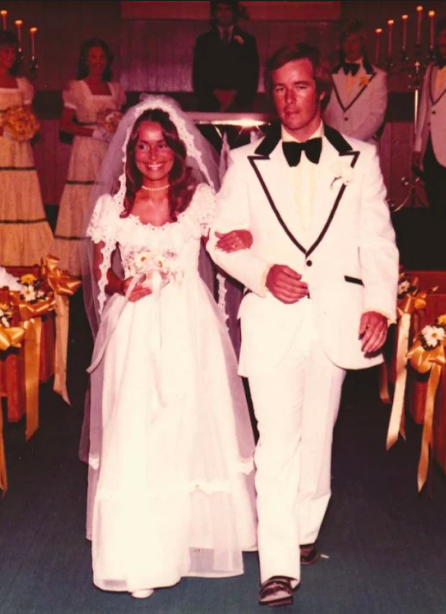
I’m looking at her, and it took her about sixty seconds to refute that doctrine of “you can’t fall in love at first sight.” Because I did. And then, every moment I was with her after that confirmed that she was the one. After about three or four weeks, I was sure that she was the one. We spent the whole summer together. And by the end of summer, we knew we wanted to get married. She moved to Fort Worth, and we finished my third year. She worked as a dental assistant for a year, and then we got married on June 1, a year later, in 1974.
Then I get to seminary and become the teacher of all the Young Life college kids, and then I started a church. The aristocracy of the city started coming to this church. Our best friends were John and Nancy Snyder, [as in] John Snyder Oil Company, which is a publicly-traded company. I’m hanging out with CEOs and lawyers that are ten years older than me.
Often, we would spend the evening with people asking me questions. I grew up poor, not understanding anything about this class of people, these kinds of homes or country clubs. And now, we were going to exclusive restaurants and country clubs. In one sense, I’m a little bit of the center of attention, because some of these folks are brand new Christians or super hungry. And Leesa, everybody thinks she’s the most beautiful person in the room, but she doesn’t say anything.
[During] the early years, there was a sadness in Leesa that I didn’t understand. She spent those evenings, which I think are great, but then she comes home depressed and she tried to tell me about her sadness. She said, “How would you feel if you spent the whole evening and you didn’t say a word?”
I wasn’t sensitive to it, and it would be thirty years before I found out the real source, which I tell later, toward the end of the book. It took thirty-two years to tell me why she would walk into a room and feel disqualified, and it had to do with the sexual abuse that came from her father when she was five years old. From the time she was five, until the time she was twelve, she was sexually assaulted by her father, the Christian high school football coach.
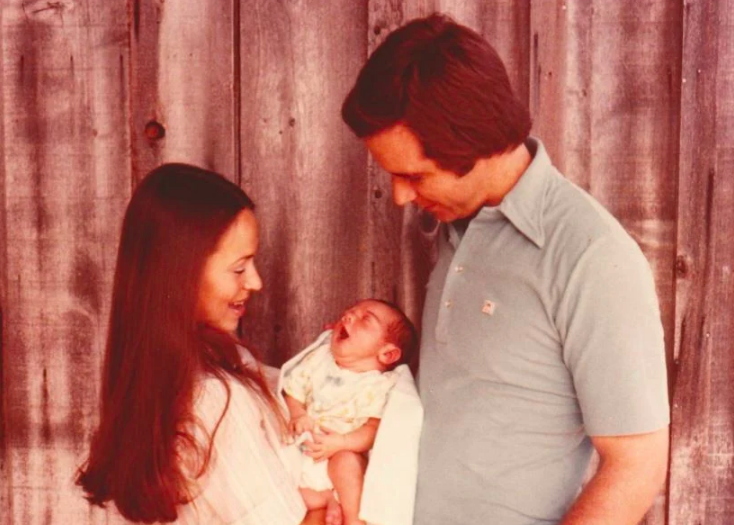
Although I had plenty of my own shame, I didn’t even think in those categories. I just thought You have an unpleasant feeling. Just get rid of it. I lived out of my mind, not out of my feelings. Her salvation came when we had our first child, Steven Craig Deere. She threw herself into motherhood, and that became the chief joy of her life.
“Although I had plenty of my own shame, I didn’t even think in those categories. I just thought, You have an unpleasant feeling. Just get rid of it. I lived out of my mind, not out of my feelings.” – Jack Deere
Believing God Is Still Good, Even Through the Darkness
At twenty-seven, I became a professor of Old Testament exegesis and Semitic languages at Dallas Seminary. I became a professor, I became a church planter that plants a really great church. So from the time I was seventeen, until the time I was fifty-two, pretty much everything I touched turned to gold.
It’s like everything has worked out in my life. We’re living on a Montana mountain in Whitefish, Montana. I can hunt, literally, all over the world. That was my passion, hunting. I had great friends, and [there was only one] negative thing in our life. We had three children. Steven, our firstborn, was brilliant, a great writer. Elise, our baby, [was a] perfect child, just like her mom. Beautiful, a straight-A student.
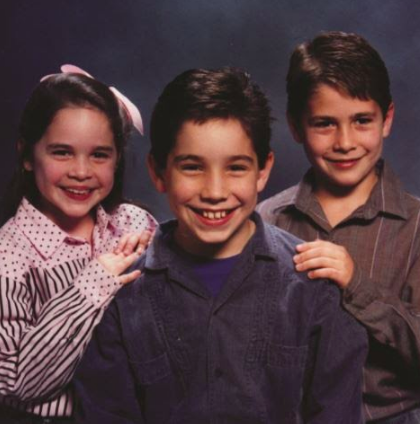
And then Scott, our second-born son, was in the middle. Scott was a handful from the day he was born. He was the life of every party he’d ever been to. He got involved in drugs in our church parking lot about the time he was twelve or thirteen, and [went to] rehab when he was eighteen. He was in rehab for seven months. He got clean. We would grab hold of the hope that it would last.
And then on December 27, 2000, after Christmas, Scott mixed five things, none of which are lethal, but when you put them all together, they become a lethal cocktail. They carried him into this realm of psychotic invulnerability, and about five o’clock in the morning, he shot himself in our home in Montana with my .44 Magnum, the gun that we left downstairs in the kitchen to scare away bears.
We went into a cave. I mean, I lost my story for living. I started questioning everything. Why go to church? I mean, I go to church because I have something to say, but I don’t have anything to say anymore. I’m not sure I know God. I’m not sure I know this side of Him I don’t know. I can’t do anything. I can’t even make a decision about his funeral.
If it hadn’t been for our good friends, I don’t know what would have happened to us. For months, we didn’t have to do a single thing. We were so protected and cared for by them.
I started keeping a journal during this time of what I was feeling, of what I was going through, of what was happening, what was happening to Leesa. I clung to one verse of scripture, Psalm 119:68. “You are good. And what you do, it’s good.” I would cling to that and I would say, “Even though I can’t see how this is good, I choose to believe that what you do is good.”
But I can’t write anymore. I can’t write a single sentence. I can’t grow a church anymore. Leesa chose to go on opioids and alcohol, to go that route with her pain, and I can’t get her sober.
In this recovery period, after we lost Scott, it’s like He took everything away that made me feel important. He took away writing. He took away my ability to go to church. He took away money, and He wouldn’t let me get Leesa sober. He took away everything. There was nothing left but Him and His affection. And that’s when my life began to change. I began to see that the most important thing in life is feeling the affection of God, actually being friends with Him. We love Him because He first loved us.
“I began to see that the most important thing in life is feeling the affection of God, actually being friends with Him. We love Him because He first loved us.” – Jack Deere
And so the bulk of my prayer life became, “Let me see your beauty. Let me be in your circle of friendship.” And then things began to change.
That was a turning point in my life, and that’s when I started writing again. I’d write sentences, and I wrote the first chapter of this book. Basically what one of my goals has been, one of my prayers has been, “Lord, let this book reach people who don’t go to church, who don’t necessarily believe in God. Let them see Your beauty in this story and read the story for the sake of the beauty in it.”
My prayer for the book is that it will bring people to the Lord, people back to the Lord, and deepen the friendship that people have with the Lord. Which is what Jesus Calling has done. And I pray that my book will do that as well.
Narrator: You can find Jack Deere’s book, Even in Our Darkness: A Story of Beauty in a Broken Life, wherever books are sold.
Narrator: Next time on the Jesus Calling Podcast, we speak with Nona Jones, the head of faith-based partnerships at Facebook. A successful young woman who speaks in front of thousands, Nona is a mother and a pastor’s wife. She recalls a darker time when she was a child who was struggling in an abusive environment, and the day a friend invited her to church, where she found unconditional love for the first time.
Nona: Throughout elementary school, I had always been the kid that was acting out. I was labeled a problem child. And the reason I was acting out was because of so much chaos at home. I was responding and reacting to trauma that nobody ever asked [about]. They just assumed that I was a bad kid.
She invited me to go to church, and I’ll never forget the first time I walked in that church. There were people who didn’t even know me, but they hugged me and they loved me. They welcomed me. They really made me feel like I belonged, and that was the first time I ever felt like I really mattered, like I was really valued.
Narrator: Do you love hearing these stories of faith weekly from people like you whose lives have been changed by a closer walk with God? Then be sure to subscribe to the Jesus Calling: Stories of Faith Podcast on Apple Podcasts, Stitcher, or wherever you listen to your podcasts. If you like what you’re hearing, leave us a review so that we can reach others with these inspirational stories. And, you can also see these interviews on video as part of our original web series with a new interview premiering every other Sunday on Facebook Live. Find previously broadcasted interviews on our Youtube channel, on IGTV, or on jesuscalling.com/media/video.
